- Home
- Jack Kerouac
Vanity of Duluoz: An Adventurous Education, 1935-46 Page 6
Vanity of Duluoz: An Adventurous Education, 1935-46 Read online
Page 6
Book Four
I
It’s one goddamn crisis after a friggin other. Dont have to print that. But will. It’s English. It’s the daily newspaper.
Did I come into this world thru the womb of my mother the earth just so I could talk and write like everybody else?
Because this is the part that will interest you, wifey. It was the summer of 1940 and I had nothing to do but sleep at home in my bedroom on Gershom Avenue now, go swimming when I felt like it, go beering on Saturday nights with G. J. and Lousy and Scotcho and the boys on Moody Street, hang around reading Jack London’s life and pin up long words I couldnt memorize, write them down in big letters on slips of paper and pin them all over my bedroom wall so’s in the morning when I woke up there it would be staring me in the face: the bunch of words on the wall: ‘Ubiquitous’, ‘Surreptitious’, ‘Demonological’, ‘Business’, ‘Urine’. Just kidding. Just light my lamp at midnight in the cool Lowell summernights and read Thomas Hardy. And under the influence of Jonathan Miller start writing my own brand of serious ‘Hemingway’ stories, later . . . later a voice was calling me from Gershom Avenue, which, as you may know, is the street where is located the Pawtucketville Social Club that my father used to run, the bowling alley and poolroom. Pa still bowled and played pool there but was no longer the manager. Nevertheless in the company of old Joe Fortier, Sr, he could be heard yelling across the echoey neighborhood and you could hear old Joe swearing up a storm that had the Merrimack River bored in her rocks. Great fat stars gloomy with fat stared down at me, putting men now in the mind of what Thoreau said about the little blisters that appear on good autumn pears when you look at em close with a magnifying glass: he said the blisters ‘they whisper of the happy stars’, whilst russet red McIntosh apples only yell of the sun and its redness. I’m hanging around and there’s the call ‘Jack-eeee’ out on Gershom Avenue. I go out, look down the long fifteen steps of the street porch and there stands a curly black-haired boy strangely familiar. ‘Aint you the guy called me from the street when I was twelve on Sarah Avenue?’
‘Yeh, Sabby Sayakis.’
‘Didnt I know you on the sandbank?’
‘Yes.’
‘Whattaya want?’
‘Just wanta see you, talk to you. Always wanted to.’
‘What the hell you want to see me for?’
‘No particular reason. Been watching you.’
‘Oh now I remember you, Greek kid, used to hang around, ah, with Tsotakos or sumptin, on the sandbank, come from Rosemont.’
‘Since the river flooded in 1936, we’ve moved to Stevens Street.’
‘Oh, yass,’ I said like W. C. Fields, thinking, inside, ‘So . . . nu?’
He says ‘They call me Sabby but my name is really Sabbas . . . in fact it’s Sabbas the Prince of Crete.’
‘The Prince of Crete?’
‘Aye, and I know you, you’re Baron Jean Louis Duluoz.’
‘Who told you that?’
‘O I went down to, ah, Phoebe Avenue and talked to Gussie Rigolopoulos and some of your other friends, it’s just a joke, I just want to talk to you, always wanted to.’ We sat on the doorstep. ‘Do you read Saroyan?’ he says. ‘Thomas Wolfe?’
‘No, who are they?’
He says: ‘I want to write plays, produce, direct, and act in them: I want to wear a white Russian tunic with a blood red heart sewn on the part over my heart. I’m going to be a student at a Boston dramatic school this summer. You could write plays.’
‘Who told you I wrote?’
‘Gussie told me you wrote a beautiful song about a girl at a carnival, and O he says also, I mean, he says your letters are like poems. He says you say his letters are good too.’
‘Yen I’ve got em all here.’
‘Why dont we go out and have a few sundaes, or beer if you want, and just talk about things? You know I used to go to Bartlett School too and I knew Miss Wakefield too. We could go see Miss Wakefield in fact if you’d like to, and do you know Ronnie Ryan and Arch MacDougald, they all want to meet you too, and you ran track with my best friend John Kazarakis and he told me about you too, how you used to walk around Boston after the races and eat hamburgers in the Greek joint near the El and had nothing to do . . . Have you been reading, what do you read?’
‘Well I’ve been reading Hardy, Thoreau, Emily Dickinson, Whitman . . .’
Sabby: ‘Pretty solid so far.’
I said to myself: ‘O well I’ll humor this crazy Greek and go see what he’s like.’ Out loud: ‘I’ll put on my gear and we’ll go walking downtown, see if there’s any quiff around.’
‘Quiff? what’s that?’
‘Girls, you dumpling,’ I shoulda said, but I said nothing, because after all who knows even to this day what ‘quiff’ is, even in Lowell, Lawrence, Haverhill, Concord, Manchester, Laconis, Franconia, St Johnsbury, St Magog or Hudson’s Bay or in any direction south or west, or, should I dare say it, east?
II
Anyway, wifey, that’s how I finally started to talk to your brother Sabbas, who said he was the Prince of Crete, which he probably was once, but only recently of Spartan, or Maniatti, descent.
Big curly-haired guy, thought he was a poet, and was, and as we got to be friendly began to instruct me in the arts of being interested (as they say in Mexico, interesa) in literature and the arts of kindness. I put him in this chapter (say I archly) about Columbia, because he really belongs to that period which followed the adolescence of the prep school and introduces the serious business.
Among my souvenirs, by God, is the friendship of Sabbas Savakis.
And I’ll tell you why in plain English poesy: he’d sing me ‘Begin the Beguine’ in a big voice whether we were crossing the bridge, sitting in saloons or just on my doorstep or his own father’s doorstep in the Lower Highlands. He’d yell Byron at me: ‘So we’ll go no more-a-roving / So late into the night . . .’ It’s not because he died in the war, on the beachhead at Anzio wounded, died in an Algiers North Africa hospital of gangrene, or probably broken heart, because a lot of other guys died in World War II including some I’ve already mentioned in this book (Kazarakis, Gold, Hampshire, others I dont even know what happened), but because the memorabilia of my knit just knits a knight in my night’s mind. That’s plain English poesy? Because, okay, he was a great kid, knightlike, i.e., noble, a poet, goodlooking, crazy, sweet, sad, everything a man should want as a friend.
III
Actually I didnt see much of Sabbas that summer, it was mainly the old gang and a lot of swimming at Pine Brook, to which we walked 2½ miles to our own special ‘Bareass Beach’ as ‘twas called, where, once when I was eleven years old, basking nekkid in the sun with the gang, here comes my Marist brother who taught me fifth grade at St Joseph’s Parochial School, all dressed in black, plowing across the furzy brush of the woods as tho he was coming to chastise me: but instead he whips off his robes and runs yelling and diving into the brook in his shorts. Girls had to make a detour around this beach. By the time I went to Columbia in early September for the beginning of football training I was as brown as Muhammed Mayi.
In fact that was the summer, too, when Pa unexpectedly joined me and the boys on the 2½-mile walk on a particularly hot evening and he too, whipping off his clothes, yipped and ran in his shorts to the edge of the brook and jumped in feet first. But he weighed 250 pounds and the weather’d been dry all August and he landed standing in 3 feet of water and almost broke his ankle. It really almost broke my heart, to see him so happy in his yipping leap and end up toppling over in that little fetid pint of water.
The time for Pine Brook was always dawn, when the water was cool, especially June, July, when we used to have underwater distance contests and go considerable distances flapping low among the white stones below. Over 100 feet sometimes I’d go, this was before we all started smoking. Gen
e Plouffe used to do the double donut flopflop right off a 30-foot perch in a tree. Lousy used to slip right into 6 feet of water and come up as if skimming the surface. When I tried this too (off the 30-foot perch) I always hit the sandy bottom with my hands. It was just a case of hanging around in the grass and suddenly saying ‘Ah hell it’s hot’ and jumping in. We also played a lot of baseball in Dracut Tigers field, scrub it’s called, where you get to bat and get ten whacks out, if you keep hitting singles or homeruns you keep going till you’re out ten times, either from fly ball or thrown out at first, though none of us bothered to run them out. Then you go into right field and work your way back. This was the way we worked out our occasional night-before beerfests. The first night we all got drunk, a brawling hot night on Moody Street, we were all so exhilarated we kept grabbing everybody in the street and telling them they were God, old men, other guys, everybody, even one another. This ended up in a puking wrestling match under the stars by the moaning river with mobs of homecoming drunks watching saying ‘Looka those crazy kids, drunk for the first time, d’jever see the likes of such slobs?’ This was when I was beginning to gain my reputation as ‘Zagg’, which was the name of the Pawtucketville town drunk who kept throwing up his hands like Hugh Herbert and saying ‘Woo Woo.’ I was at bat in a twilight game of baseball, the pitcher chewing his cud was examining the catcher’s sign, I waved the bat, I was barechested because lobster red from a sunburn caught the day in the hot haze at Lakeview, suddenly as the pitcher winds up and I ‘coil’ to get ready, that crazy G. J. yells out ‘That’s what we’ll call him . . . ZAGG!’ And I watched a strike go by under my chest.
Of Sabby Savakis more anon, it was the following summer, 1941, we ran around more and went into the study of poetry and plays and did some hitchhiking and cemented our friendship.
IV
But now some old buddies, the Ladeau brothers, proposed to drive me to New York for my school year because they were going to see the World’s Fair at Flushing Meadows and might as well take me along for the ride and I could help with the gas instead of taking the bus. And who comes along, riding in the rumbleseat in back of the old 1935 coupe, hair blowing in the wind, singing, ‘Whoooeee, here we come New York!’ if it wasnt my old Pop himself, Emil? Me and 350 pounds of Pop and baggage in a rumbleseat, all the way with the car veering here, veering there, I guess from the unsuitable disposition of weight in the back, all the way to Manhattan, 116th Street, Columbia campus, where me and Pa got out with my gear and went into my dormitory, Hartley Hall.
What dreams you get when you think you’re going to go to college! Here we stood in this sort of drear room overlooking Amsterdam Avenue, a wooden desk, bed, chairs, bare walls, and one huge cockroach suddenly rushing off. Furthermore in walks a little kid with glasses wearing a blue skullcap and announces he will be my roommate for the year and that he is a pledge with the Wi Delta Woowoo fraternity and that’s the skullcap. ‘When they rush you you’ll have to wear one too.’ But I was already devising means of changing my room on account of that cockroach and others I saw later, bigger.
Pa and I then went out on the town, to the World’s Fair too, restaurants, the usual, and when he left he said, as usual: ‘Now study, play good ball, pay attention to what the coach and the profs tell you and see if you cant make your old man proud and maybe be an all-America.’ Fat chance, with the war a year away and England already under blitz.
It seems I had chosen football and come to the brim of the top of it just at that time when it would no longer matter to anybody or his uncle.
There were always tears in my Pa’s eyes when he said goodbye to me, always tears in his eyes those later years, he was, as my mother often said, ‘Un vrai Duluoz, ils font ainque braillez pi’s lamentez [A real Duluoz, all they do is cry and lament].’ And rage too, b’God, as you’ll see later when my Pa finally got to meet Coach Lu Libble of Columbia.
Because from the start I saw that the same old boloney was going to be pulled on me as in Lowell High School. In the freshman backfield there was a good blocking boy called Humphrey Wheeler, but slow, and a slow plodding fullback called Runstedt, and that’s about it. Absolutely nobody of any real ability and nothing like the gang at HM. In fact one of the boys was small, slow, weak, nothing at all in particular, and yet they started him instead of me and later on I talk to him and discover he’s the son of the police chief of Scranton. Never in my life have I ever seen such a bum team. The freshman coach was Rolfe Firney who had made his mark at Columbia as a very good back who’d made a sensational run against Navy that won the game in 1934 or so. He was a good man, I liked Rolfe, but he seemed to keep warning me about something all the time and whenever the big coach, famous Lu Libble went by, all sartorial in one of his 100 suits, he never even gave me the once-over.
The fact of the matter is, Lu Libble was very famous because in his very first year as coach at Columbia, using a system of his own devised at his alma mater, Georgetown, he won the bloody Rose Bowl against Stanford. It was such a sensational smash in the eye all over football America nobody ever got over it, but that was 1934, and here it was 1940 and he hadnt done anything noteworthy since with his team and went clear into the 1950s doing nothing further either. I think it was that bunch of players he had in 1934 who carried him over: Cliff Montgomery, Al Barabas, et al., and the surprise of that crazy KT-79 play of his that took everybody a year to understand. It was simply . . . well I had to run it, anyway, and you’ll understand it when we run it.
So here I am out with the Columbia freshman team and I see I’m not going to be a starter. Will admit one thing, I wasnt being encouraged, as I’d been by Coach Ump Mayhew at HM, and psychologically this made me feel lackadaisical and my punting, for instance, fell off. I couldnt get off a good kick anymore and they didnt believe in the quick kick. I guess they didnt believe in touchdowns either. We practiced at Baker Field in the one field in back. At dusk you could see the lights of New York across the Harlem River, it was right smack in the middle of New York City, even tugboats went by in the Harlem River, a great bridge crossed it full of cars, I couldnt understand what had gone wrong.
One great move I made was to switch my dormitory room from Hartley Hall to Livingston Hall where there were no cockroaches and where b’God I had a room all to myself, on the second floor, overlooking the beautiful trees and walkways of the campus and overlooking, to my greatest delight, besides the Van Am Quadrangle, the library itself, the new one, with its stone frieze running around entire with the names engraved in stone forever: ‘Goethe . . . Voltaire . . . Shakespeare . . . Molière . . . Dante.’ That was more like it. Lighting my fragrant pipe at 8 P.M., I’d open the pages of my homework, turn on station WQXR for the continual classical music, and sit there, in the golden glow of my lamp, in a sweater, sigh and say ‘Well now I’m a collegian at last.’
V
Only trouble is, the first week of school my job began as a dishwasher in the diningroom cafeteria sinks: this was to pay for my meals. Secondly, classes. Thirdly, homework: i.e., read Homer’s Iliad in three days and then the Odyssey in three more. Finally, go to football practice at four in the afternoon and return to my room at eight, eating voracious suppers right after at the training table in John Jay Hall upstairs. (Plenty of milk, plenty of meat, dry toast, that was good.)
But who on earth in his right mind can think that anybody can do all these things in one week? And get some sleep? And rest war-torn muscles? ‘Well,’ said they, ‘this is the Ivy League son, this is no college or group of colleges where you get a Cadillac and some money just because you play football, and remember you’re on a Columbia University Club scholarship and you’ve got to get good marks. They cant feed you free, it’s against the Ivy League rules against preference for athletes.’ In fact, tho, the entire Columbia football gang, both varsity and freshmen, had B averages. It was true. We had to work like Trojans to get our education and the old white-haired trainer used to intone, ‘
All for glory, me boys, all for glory.’
It was the work in the cafeteria that bothered me: because on Sundays it was closed and nobody who worked got to eat anything. I s’pose in this case we were s’posed to eat at the homes of friends in New York City or New Jersey or get food money from home. Some scholarship.
I did get invited to dinner, formally with a big formal card, by the dean of Columbia College, old Dean Hawkes, in the house on Morningside Drive or thereabouts right near the house of Nicholas Murry Butler, the president of Columbia. Here, all dressed up in Ma’s best McQuade-Lowell-selected sports coat, with white shirt and tie and pressed slacks (the cleaner was on Amsterdam across the street), I sat and ate my soup by gently lifting the saucer away from me, spooning away from me, smiled politely, hair perfectly combed, showed suave interest in jokes and awe in the dean’s serious moments. The entree was meat but I cut it delicately. I had the best table manners in those days because my sister Ti Nin had trained me back in Lowell for these past several years; she was a fan of Emily Post’s. When, after dinner, the dean got up and showed me (and the three other special lads) his prized Dinosaur Egg I registered actual amazement; whoever thought I’d get to see a billion-year-old egg in the house of an old distinguished dean? I say house, it was a sumptuous apartment. He thereupon wrote a note to my mother saying: ‘Your son, John L. Duluoz, may I say with pride, Mrs Duluoz, has absolutely the best and most charming table manners it has ever been my pleasure to enjoy at my dinner table.’ (Something like that.) She never forgot that. She told Pa. He said ‘Good boy,’ tho when Pa and I used to eat late-night snacks in Lowell it was eggs this way, butter that way, hell be damned, up on the ceiling, EAT.

 Tristessa
Tristessa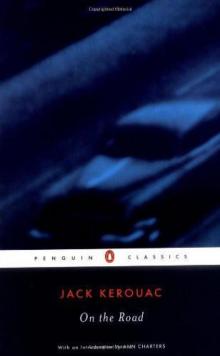 On the Road
On the Road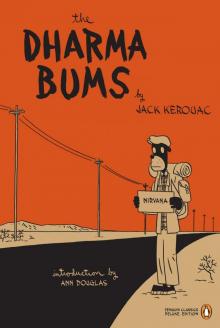 The Dharma Bums
The Dharma Bums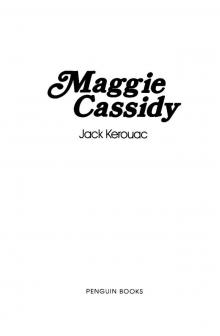 Maggie Cassidy
Maggie Cassidy Big Sur
Big Sur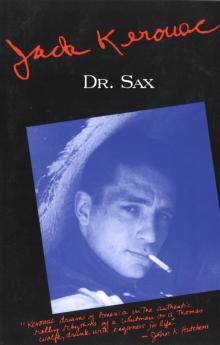 Dr. Sax
Dr. Sax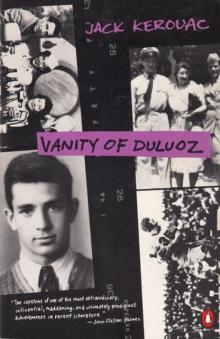 Vanity of Duluoz: An Adventurous Education, 1935-46
Vanity of Duluoz: An Adventurous Education, 1935-46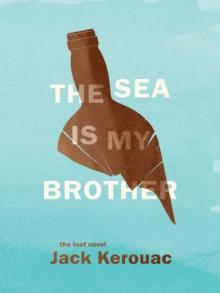 The Sea Is My Brother
The Sea Is My Brother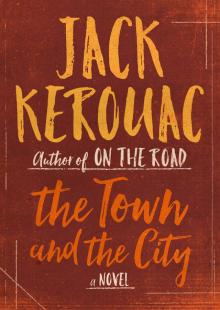 The Town and the City: A Novel
The Town and the City: A Novel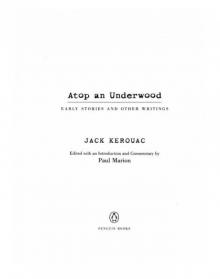 Atop an Underwood: Early Stories and Other Writings
Atop an Underwood: Early Stories and Other Writings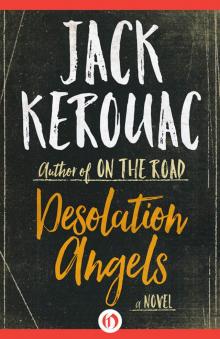 Desolation Angels: A Novel
Desolation Angels: A Novel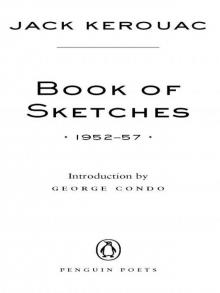 Book of Sketches
Book of Sketches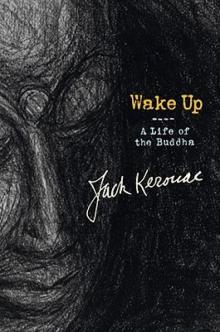 Wake Up: A Life of the Buddha
Wake Up: A Life of the Buddha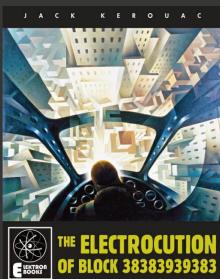 The Electrocution of Block 38383939383
The Electrocution of Block 38383939383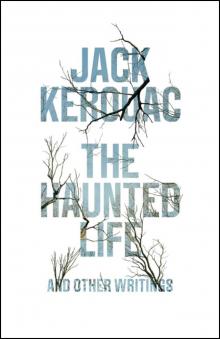 Haunted Life
Haunted Life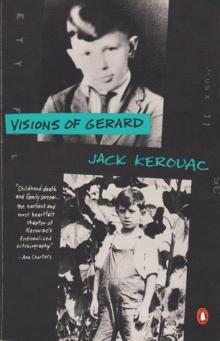 Visions of Gerard
Visions of Gerard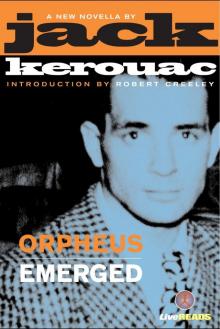 Orpheus Emerged
Orpheus Emerged Book of Blues
Book of Blues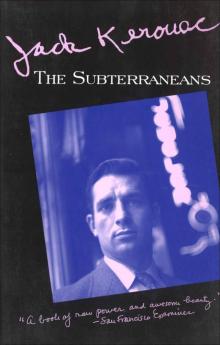 The Subterraneans
The Subterraneans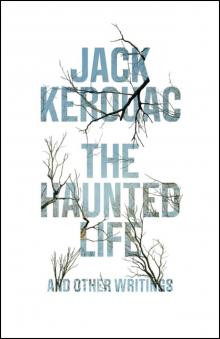 The Haunted Life
The Haunted Life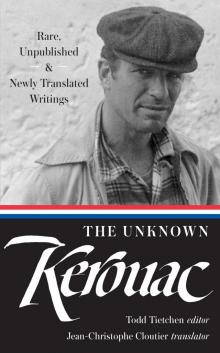 The Unknown Kerouac
The Unknown Kerouac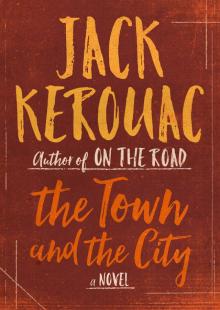 The Town and the City
The Town and the City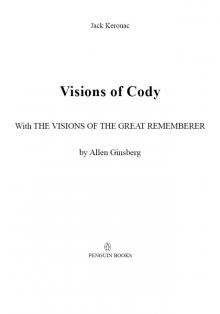 Visions of Cody
Visions of Cody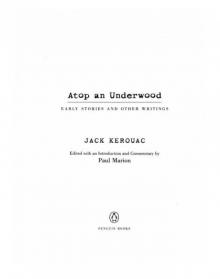 Atop an Underwood
Atop an Underwood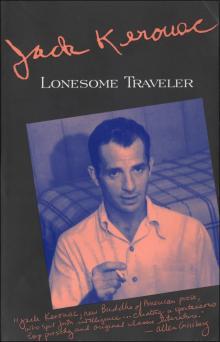 Lonesome Traveler
Lonesome Traveler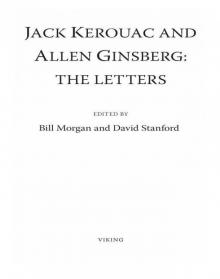 Jack Kerouac and Allen Ginsberg
Jack Kerouac and Allen Ginsberg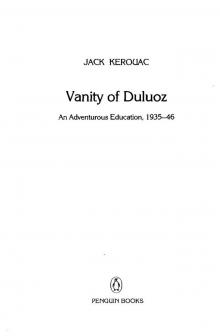 Vanity of Duluoz
Vanity of Duluoz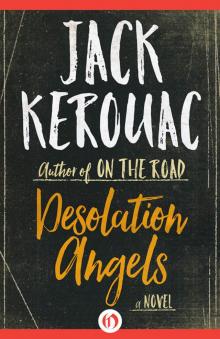 Desolation Angels
Desolation Angels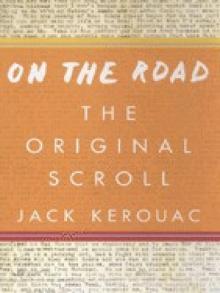 On the Road: The Original Scroll: (Penguin Classics Deluxe Edition)
On the Road: The Original Scroll: (Penguin Classics Deluxe Edition)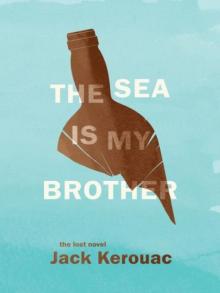 The Sea Is My Brother: The Lost Novel
The Sea Is My Brother: The Lost Novel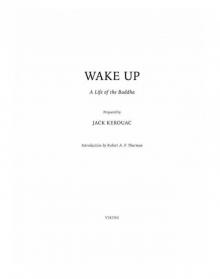 Wake Up
Wake Up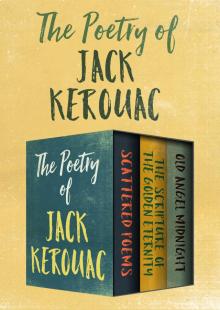 The Poetry of Jack Kerouac
The Poetry of Jack Kerouac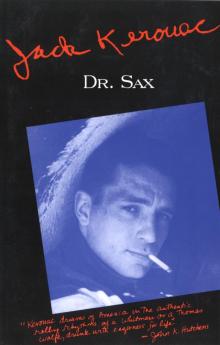 Doctor Sax
Doctor Sax